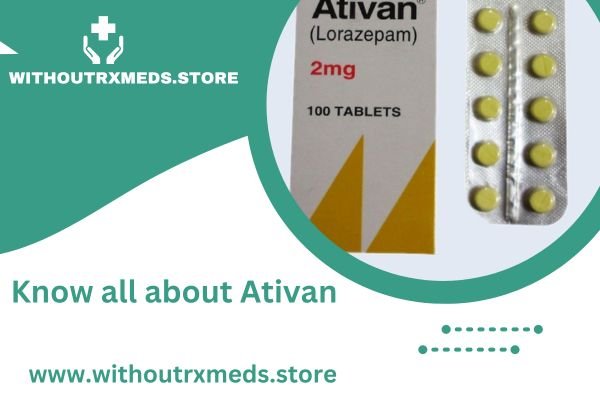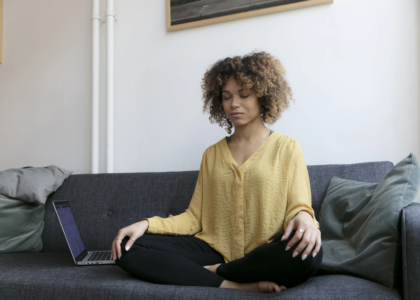Anxiety feels like an overwhelming storm; its waves crash against the mind, blinding judgment, disrupting thoughts, and leaves the person paralyzed. For millions across the globe, the relentless condition poses like an uphill climb to be controlled. One of the drugs that’s usually prescribed to reduce and even eliminate anxiety symptoms is Ativan, which is a part of the benzodiazepine family. However, how effective is this drug in treating anxiety? And, more importantly, what risks are associated with relying on such medication for relief?
In this blog, we shall discuss how Ativan works for anxiety, how well it is effective in it, and what you should know about using it safely.
What Is Ativan and How Does It Work?
Ativan, also known as lorazepam, is one of the benzodiazepines, a class of drugs that includes such prescription medicines as Valium and Xanax. All these central nervous system depressants, or CNS depressants, slow the activity of the brain to calm the person down.
Ativan enhances the activity of a neurotransmitter called gamma-aminobutyric acid in the brain. It is known that GABA naturally calms the functioning of the brain by suppressing feelings of anxiety, tension, and stress; hence, by increasing its effects, Ativan induces relaxation and eases muscle tension, giving one that sense of being calm, which makes it very effective for those suffering from anxiety disorders.
How Effective Is Ativan in Anxiety Symptoms Management?
Ativan can be effective at reducing the symptoms of anxiety over relatively short periods. That said, here is how it works:
Rapid Relief for Acute Anxiety: One of the standout features of Ativan is its fast-acting nature. It typically begins to relieve symptoms of anxiety within 30 to 60 minutes if taken. This makes it ideal for acute anxiety or panic attacks where rapid relief is of the essence.
Calming the Mind and Body: Ativan works toward alleviating even the physical symptoms of anxiety, such as a racing heart, fast breathing, and muscle tension. This process calms the body enough to allow someone to regain some semblance of control and begin to relinquish that uncontrolled sense of fear and panic often associated with anxiety.
Short-Term Efficacy: Ativan is effective for short-term symptoms of anxiety, including times of heightened stress or certain situations which may provoke the anxiety (e.g., prior to a public speech or job interview). In individuals who experience situational or episodic anxiety, Ativan can provide rapid relief and enable them to endure a stressful situation without becoming overwhelmed.
When Does Ativan Fail to Respond to Anxiety?
While Ativan can provide rapid relief, it is not a long-term solution for anxiety disorders. Here’s why:
The big problem that is associated with Ativan and other benzodiazepines is the likelihood of dependence and tolerance. People may develop tolerance to this medication as a result of prolonged exposure, requiring higher doses to achieve the same effect. This increases the risk for both physical and psychological dependence. Thus, by health practitioners, Ativan is prescribed for short durations only, usually a maximum of two to four weeks.
There is Limited Effectiveness for Chronic Anxiety: Ativan short-term anxiety can be controlled; however, it does not remedy the basis of chronic anxiety or generalized anxiety disorder. The continued use may mask the symptoms but offer no long-term relief. Long-term management of anxiety will most often be advised to follow up with therapy (such as Cognitive Behavioral Therapy) and/or other medications that are more beneficial for long-term treatment.
At What Stage Should One Use Ativan for Anxiety?
Ativan is a valuable medication to control anxiety, but knowing how and when to take it properly is a must. These are some scenarios in which Ativan would be prescribed:
Acute Anxiety or Panic Attack: For a panic attack where symptoms can escalate rapidly, Ativan could save the day. This is a sort of “emergency medication” to calm the mind and body temporarily for short-term relief.
Situational Anxiety: If you are suffering from anxiety over specific situations, like public speaking, flying, or other stressful situations, Ativan may be able to provide quick relief for those one-time moments.
Short Term Use: If you are coping with short-term anxiety that may be caused by stressful life events, such as a death or job change, Ativan can provide you with short-term relief while you find other ways of coping, such as counseling and therapy.
Alternative usage of Ativan to Manage Longer-Term Anxiety Conditions
If you’re looking for long-term solutions for anxiety, you may want to explore other options, including:
Cognitive Behavioral Therapy (CBT): CBT is a highly effective, evidence-based therapy that helps you identify and change negative thought patterns that fuel anxiety. It provides lasting tools to manage anxiety without the need for medication.
SSRIs and SNRIs: These categories of antidepressants are commonly prescribed to individuals diagnosed with generalized anxiety disorder (GAD) and panic disorder. Drugs such as sertraline (Zoloft) and escitalopram (Lexapro) are also employed in the treatment of chronic anxiety without danger of becoming habituated, like benzodiazepines.
Lifestyle Changes: Regular exercise, well-balanced nutrition, and other mind-oriented practices like meditation and yoga can greatly reduce anxiety while improving your overall health.
Other Medication Options: For some, other medications such as buspirone or hydroxyzine may be prescribed, which carry fewer risks of dependence than benzodiazepines like Ativan.
Conclusion: Is Ativan Right for You?
Ativan can serve as an effective, relatively rapid solution for controlling acute anxiety or situational anxiety but doesn’t serve everyone as a magic pill. Though it is temporary, Ativan must be used with great caution and usually for short periods of time because dependence and tolerance are definite factors. Long-term management of anxiety usually best involves the incorporation of both therapy and other treatment modalities, such as lifestyle changes and possibly non-benzodiazepine medications.






